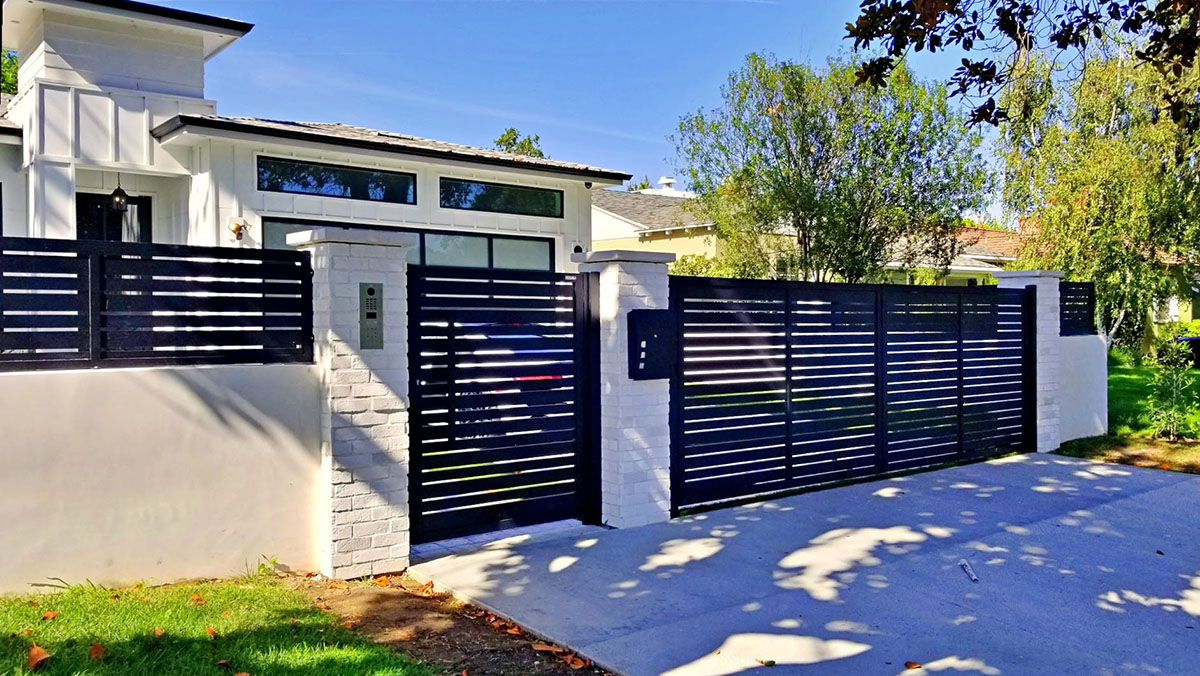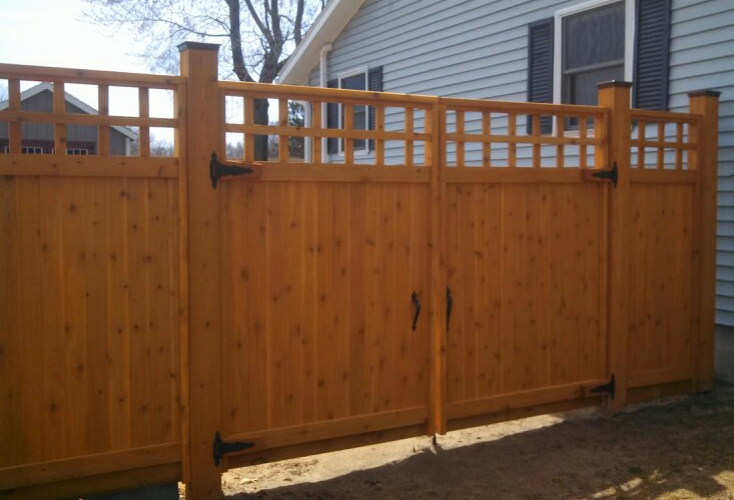All Categories
Featured
If you're thinking about mounting a fencing around your home, comprehending the license demands in your location is necessary. In this guide, we'll damage down the different authorizations you may need to mount a fence and exactly how to ensure your task stays compliant with regional laws.
Why Are Allows Required for Fence Installation? Permits are needed to make certain that the fencing you build adheres to neighborhood building codes, zoning laws, and safety standards. They guarantee that the fence won't obstruct utilities, traffic flow, or create risks for pedestrians.
![]()
Sorts Of Permits You Might Demand. Structure License. A building authorization is the most typical need for installing a fence. This authorization makes certain that the framework you construct abide by local safety codes and guidelines. You might require to get a structure license if your fencing goes beyond a particular elevation (usually around 6 feet) The local authorities will normally examine your plans to ensure that your fence is structurally audio and safe.
Zoning Authorization. Zoning regulations govern land usage in your area, and they usually regulate where fences can be installed, as well as how high they can be. A zoning permit makes sure that your fencing abides by these guidelines. For instance, your fence may require to be held up a certain distance from pathways or building lines. Zoning policies can vary by neighborhood, so it's important to check the specific guidelines that relate to your location.
Homeowners Organization (HOA) Approval. If your property is part of a homeowners organization, you may require authorization before installing a fencing. HOAs usually have strict guidelines pertaining to the type, design, and products used for fencings to preserve a consistent look throughout the neighborhood.
Specialty Permits. In some cases, you might require specialty allows based on the location of your residential or commercial property or the nature of your fencing. For instance, if your home remains in a flood area, you may require added authorizations to ensure that your fence does not block drain or water circulation. Similarly, if you prepare to build a fence near an ecologically safeguarded location, you might require an unique authorization to adhere to ecological regulations.
![]()
Utility Easements and Utility Company Authorizations. Some residential or commercial properties have energy easements, which are areas assigned for utility cable televisions, lines, or pipes. Before mounting a fencing, you must inspect if your property has an easement. Constructing a fencing within an easement can hinder utility maintenance or damage underground lines. You might need approval from the utility company or local authorities prior to proceeding with the installment.
Exactly How to Figure Out Which Allows You Need. Talk To Neighborhood Authorities. The very first step in identifying the authorizations required is to call your neighborhood structure division or zoning office. They can provide particular details regarding what licenses are essential for your location. Many cities have on-line resources or sites where you can check the requirements or perhaps request a permit online.
Consult an Expert Fence Contractor. A regional fence service provider is usually aware of the authorization procedure and regional policies. They can aid you browse the demands and make sure that your project is compliant. Many service providers likewise handle the authorization application procedure in your place, saving you effort and time.
Review Your Area's HOA Standards. Make sure to evaluate their standards before using for any permits if you live in a community regulated by an HOA. The HOA might call for details styles, products, or height limitations for fences within the neighborhood. Send your strategies to them for approval before proceeding.
![]()
Repercussions of Not Obtaining an Authorization. Setting up a fencing without the needed licenses can lead to significant effects. Possible purchasers might wait to purchase a home with an unpermitted fence, specifically if it's in offense of zoning regulations.
Verdict. Before setting up a fence on your home, see to it you comprehend the local regulations and obtain any necessary permits. Building authorizations, zoning licenses, HOA approvals, and specialty allows all play a crucial duty in making sure that your fencing is secure, lawful, and compliant. Making the effort to research and safeguard the ideal permits will conserve you from expensive errors and possible lawful concerns in the future. Whether you're intending a privacy fencing or an attractive boundary, complying with these actions will assist make the installment procedure smooth and convenient.
Why Are Allows Required for Fence Installation? Permits are needed to make certain that the fencing you build adheres to neighborhood building codes, zoning laws, and safety standards. They guarantee that the fence won't obstruct utilities, traffic flow, or create risks for pedestrians.

Sorts Of Permits You Might Demand. Structure License. A building authorization is the most typical need for installing a fence. This authorization makes certain that the framework you construct abide by local safety codes and guidelines. You might require to get a structure license if your fencing goes beyond a particular elevation (usually around 6 feet) The local authorities will normally examine your plans to ensure that your fence is structurally audio and safe.
Zoning Authorization. Zoning regulations govern land usage in your area, and they usually regulate where fences can be installed, as well as how high they can be. A zoning permit makes sure that your fencing abides by these guidelines. For instance, your fence may require to be held up a certain distance from pathways or building lines. Zoning policies can vary by neighborhood, so it's important to check the specific guidelines that relate to your location.
Homeowners Organization (HOA) Approval. If your property is part of a homeowners organization, you may require authorization before installing a fencing. HOAs usually have strict guidelines pertaining to the type, design, and products used for fencings to preserve a consistent look throughout the neighborhood.
Specialty Permits. In some cases, you might require specialty allows based on the location of your residential or commercial property or the nature of your fencing. For instance, if your home remains in a flood area, you may require added authorizations to ensure that your fence does not block drain or water circulation. Similarly, if you prepare to build a fence near an ecologically safeguarded location, you might require an unique authorization to adhere to ecological regulations.

Utility Easements and Utility Company Authorizations. Some residential or commercial properties have energy easements, which are areas assigned for utility cable televisions, lines, or pipes. Before mounting a fencing, you must inspect if your property has an easement. Constructing a fencing within an easement can hinder utility maintenance or damage underground lines. You might need approval from the utility company or local authorities prior to proceeding with the installment.
Exactly How to Figure Out Which Allows You Need. Talk To Neighborhood Authorities. The very first step in identifying the authorizations required is to call your neighborhood structure division or zoning office. They can provide particular details regarding what licenses are essential for your location. Many cities have on-line resources or sites where you can check the requirements or perhaps request a permit online.
Consult an Expert Fence Contractor. A regional fence service provider is usually aware of the authorization procedure and regional policies. They can aid you browse the demands and make sure that your project is compliant. Many service providers likewise handle the authorization application procedure in your place, saving you effort and time.
Review Your Area's HOA Standards. Make sure to evaluate their standards before using for any permits if you live in a community regulated by an HOA. The HOA might call for details styles, products, or height limitations for fences within the neighborhood. Send your strategies to them for approval before proceeding.

Repercussions of Not Obtaining an Authorization. Setting up a fencing without the needed licenses can lead to significant effects. Possible purchasers might wait to purchase a home with an unpermitted fence, specifically if it's in offense of zoning regulations.
Verdict. Before setting up a fence on your home, see to it you comprehend the local regulations and obtain any necessary permits. Building authorizations, zoning licenses, HOA approvals, and specialty allows all play a crucial duty in making sure that your fencing is secure, lawful, and compliant. Making the effort to research and safeguard the ideal permits will conserve you from expensive errors and possible lawful concerns in the future. Whether you're intending a privacy fencing or an attractive boundary, complying with these actions will assist make the installment procedure smooth and convenient.
Latest Posts
Check Out the Best Auto Repair Discounts in Montclare, Chicago
Published May 27, 25
1 min read
Why Chicago Drivers Select Montclare Auto Repair for Reliable Service and Significant Savings
Published May 26, 25
1 min read
Find Out How WyHy Federal Credit Union Saves You Money on Loans and Savings
Published May 25, 25
1 min read
More
Latest Posts
Check Out the Best Auto Repair Discounts in Montclare, Chicago
Published May 27, 25
1 min read
Why Chicago Drivers Select Montclare Auto Repair for Reliable Service and Significant Savings
Published May 26, 25
1 min read
Find Out How WyHy Federal Credit Union Saves You Money on Loans and Savings
Published May 25, 25
1 min read